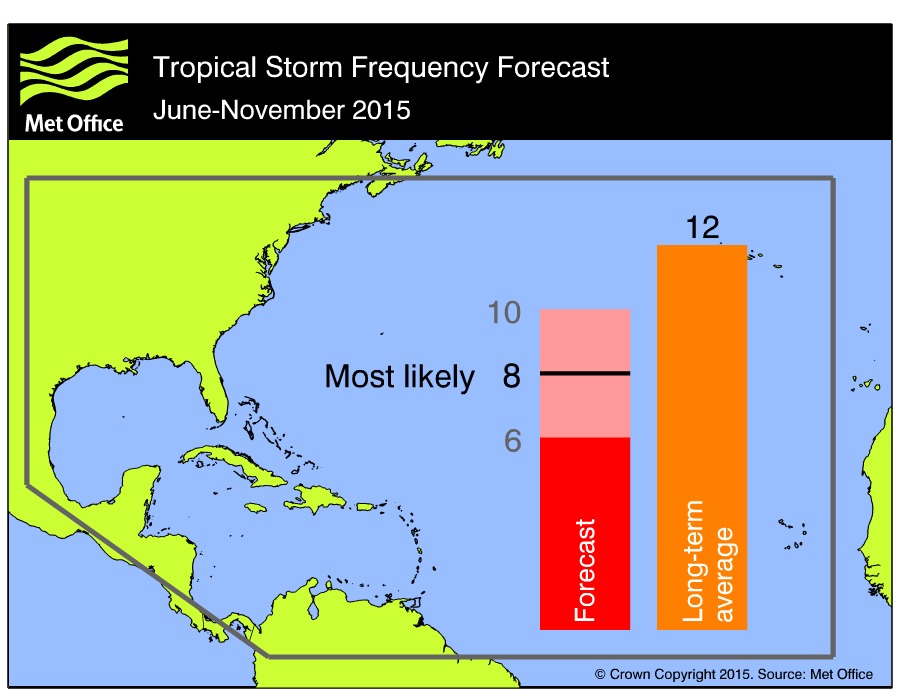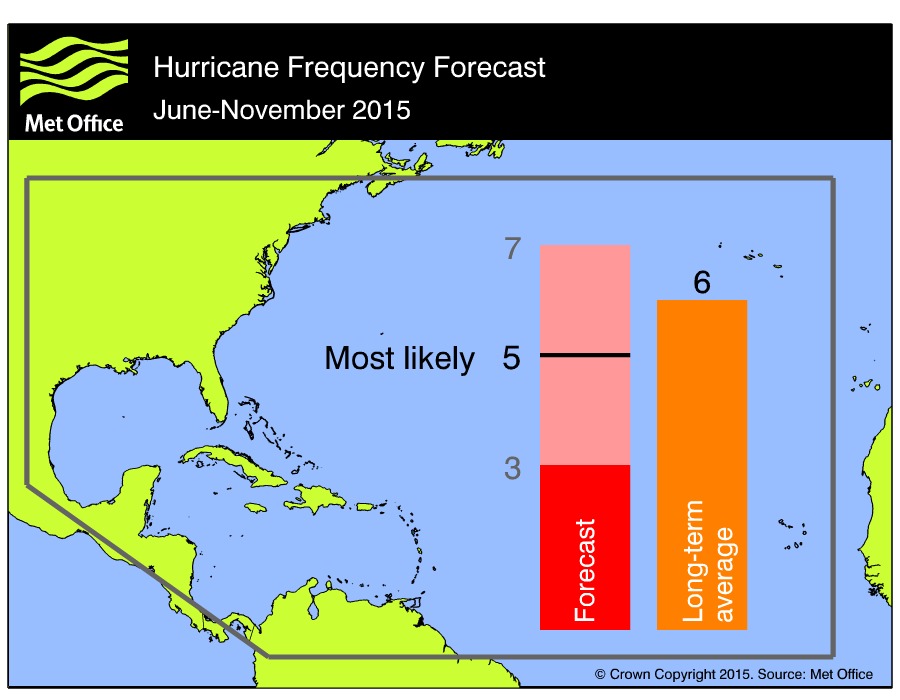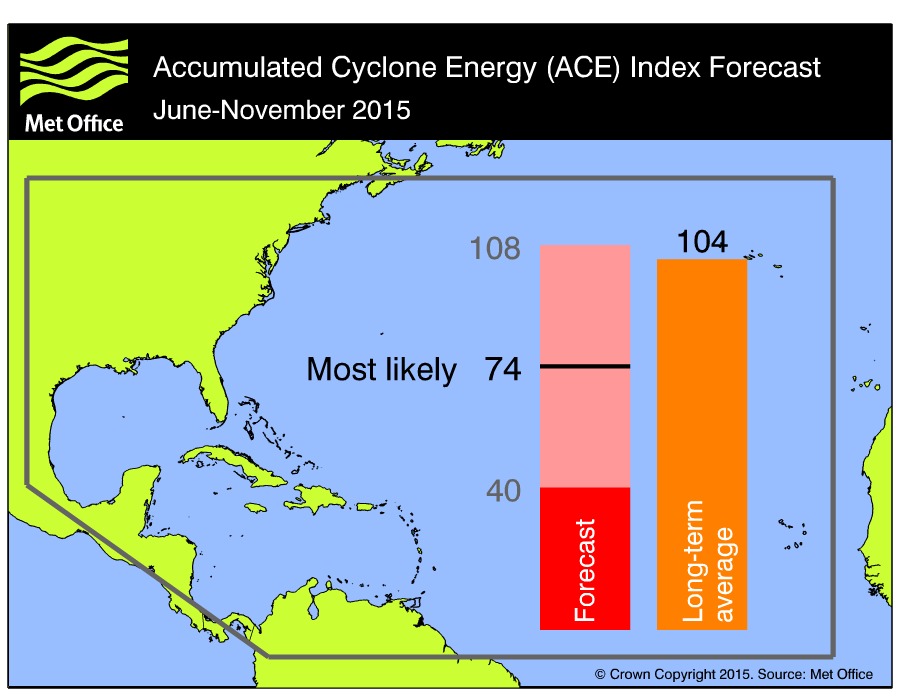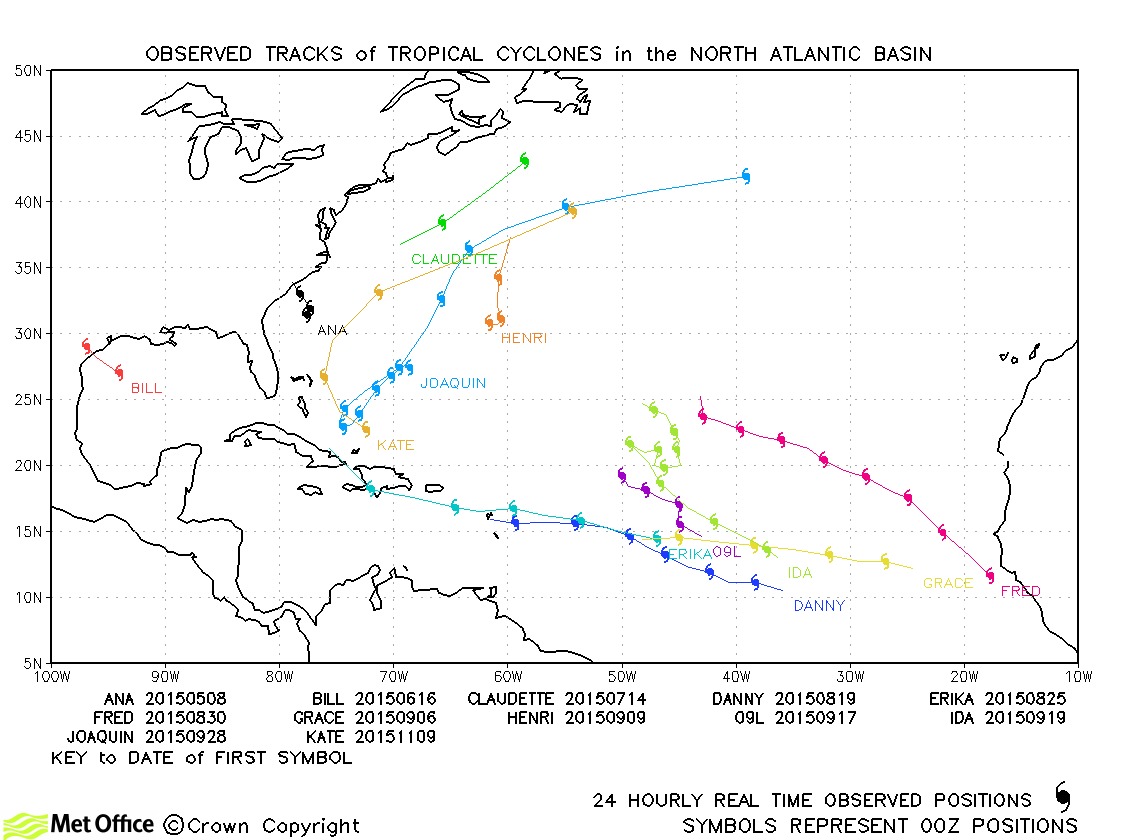North Atlantic tropical storm seasonal forecast 2015
Tropical storm seasonal forecast for the June to November period
Forecast for June to November 2015
Issued 21 May 2015
The most likely number of named tropical storms (winds of at least 39 mph) predicted to occur in the North Atlantic during the June to November period is 8, with a 70% chance that the number will be in the range 6 to 10. This represents below normal activity relative to the 1980-2010 long-term average of 12. This figure is in addition to Tropical Storm Ana which occurred in May 2015, outside the forecast period.
The most likely number of hurricanes (winds of at least 74 mph) predicted to occur in the North Atlantic during the June to November period is 5, with a 70% chance that the number will be in the range 3 to 7. This represents slightly below normal activity relative to the 1980-2010 long-term average of 6.
An ACE index of 74 is predicted as the most likely value, with a 70% chance that the index will be in the range 40 to 108 - which is below normal relative to the 1980-2010 average of 104.



Our Risk modelling collaborations provide expert advice on seasonal predictions of tropical storms. Please email [email protected] for further information.
Background
'Tropical cyclone' is the generic term for a low-pressure system over tropical or subtropical waters, with intense convective activity (e.g. thunderstorms) and winds circulating in an anticlockwise direction in the northern hemisphere (clockwise in the southern hemisphere). A tropical storm is a tropical cyclone with mean wind speeds of at least 39 mph. The terms hurricane and typhoon are region-specific names for strong tropical cyclones with wind speeds of at least 74 mph.
The North Atlantic tropical storm season usually runs from June to November. The degree of activity over the whole season varies from year to year and is measured in several ways.
- Total number of tropical storms. The number of named tropical cyclones with winds of at least 39 mph observed over the season. This is the best known measure of the level of storm activity. In this forecast the number of tropical storms also includes those that reach hurricane strength (see below).
- Total number of hurricanes. The number of tropical cyclones that reach sustained winds of at least 74 mph.
- The Accumulated Cyclone Energy (ACE) index. A measure of the collective intensity and duration of all named tropical storms and hurricanes during the season.
The table below shows the number of tropical storms, hurricanes and ACE index observed in recent years.
| Year | Tropical storms | Hurricanes | ACE index |
|---|---|---|---|
| 2010 | 19 | 12 | 164 |
| 2011 | 19 | 7 | 124 |
| 2012 | 17 | 10 | 123 |
| 2013 | 13 | 2 | 31 |
| 2014 | 8 | 6 | 65 |
Forecast
At the start of each North Atlantic season the Met Office forecasts the number of tropical storms, hurricanes and ACE index. Seasonal forecasts of tropical storm activity have been issued annually since 2007. See our previous seasonal tropical storm forecasts for 2007, 2008, 2009, 2010 , 2011, 2012, 2013 and 2014.
Method
The forecast is made using information from the Met Office global dynamical seasonal forecast system, GloSea5, which is an ensemble prediction system based on a fully coupled ocean-atmosphere general circulation model (GCM; MacLachlan et al 2014). This system simulates the ocean-atmosphere processes and interactions that determine tropical storm development. Multiple forecasts are made (using ensemble forecasting methods) to allow estimation of the range of likely outcomes. The ensemble is then used to produce a best-estimate (or most-likely) predicted value (the ensemble mean) and forecast range (using the spread in the ensemble outcomes). Further details on the forecast method can be found in Camp et al. (2015).
Skill
Recent studies have shown that dynamical models have considerable skill predicting the number of tropical storms - for example successfully predicting the change from the exceptionally active season of 2005 to the below-normal activity of the 2006 season. Full details of the skill of GloSea5 to predict tropical storm activity around the world have been documented by Camp et al. (2015).
Verification
The Met Office seasonal tropical storm forecast for the North Atlantic, issued on 21 May 2015, predicted the most likely number of tropical storms to occur during the June to November period would be 8, with a 70% chance that the number would be in the range 6 to 10. This represents below normal activity relative to the 1980-2010 long-term average of 12. The most likely number of hurricanes was predicted to be 5, with a 70% chance that the number would be in the range 3 to 7. This represents slightly below normal activity relative to the 1980-2010 long-term average of 6. An ACE index of 74 was predicted as the most likely value, with a 70% chance that the index would be in the range 40 to 108 - which was below normal relative to the 1980-2010 average of 104.
In the event the observed number of storms (10), hurricanes (4) and ACE index (58) in the June to November period were all within the predicted ranges.

A report on the forecast verification and analysis of the 2015 season for the whole northern hemisphere is now available to download. A public forecast for the June to November 2016 period in the Atlantic will be issued in May 2016.
References
Camp, J., Roberts, M., MacLachlan, C., Wallace, E., Hermanson, L., Brookshaw, A., Arribas, A., Scaife, A. A., (2015). Seasonal Forecasting of Tropical Storms Using the Met Office GloSea5 Seasonal Forecast System. Q.J.R. Meteorol. Soc.
MacLachlan, C., Arribas, A., Peterson, K. A., Maidens, A., Fereday, D., Scaife, A. A., Gordon, M., Vellinga, M., Williams, A., Comer, R. E., Camp, J., Xavier, P., Madec, G., (2014). Global Seasonal Forecast System version 5 (GloSea5): a High-Resolution Seasonal Forecast System. Q.J.R. Meteorol. Soc.
To view PDF documents you will need to download Adobe Reader




